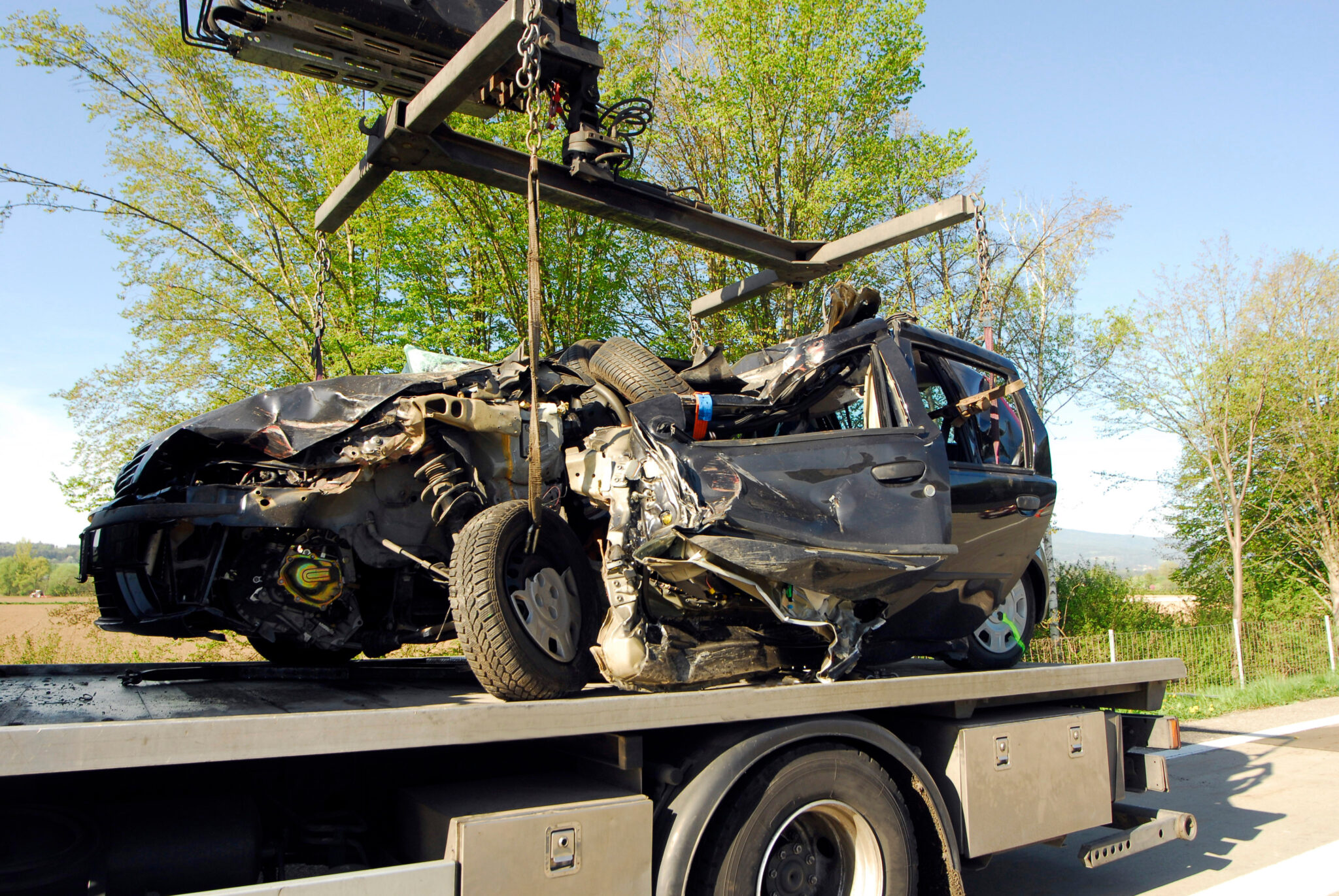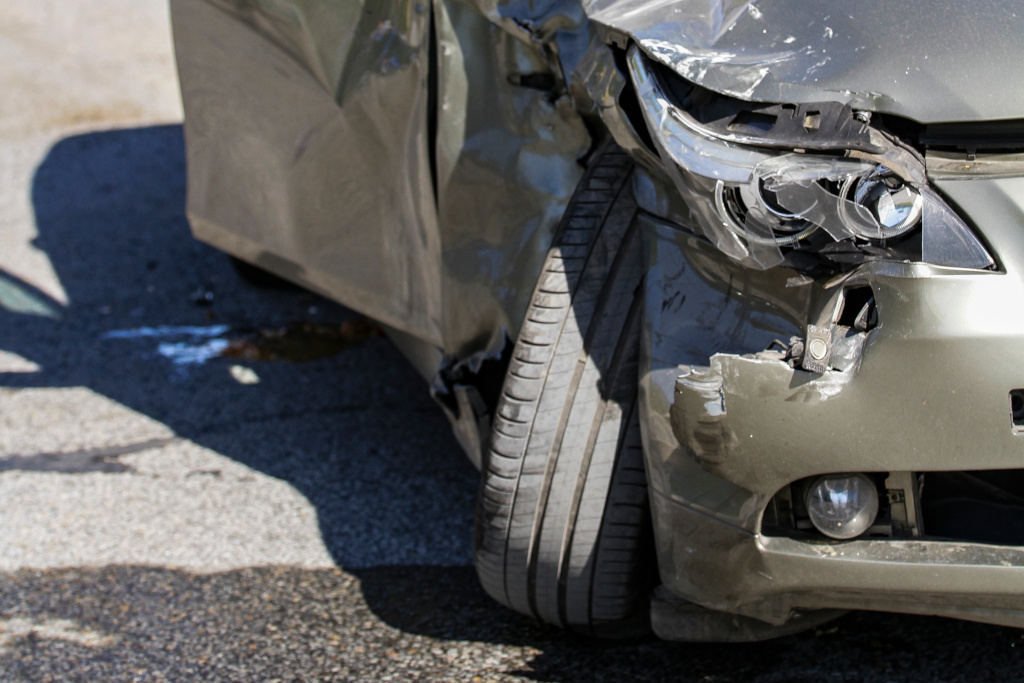Were you in an accident? There’s bound to be some damage. But sometimes the damages can be so bad that your insurer will label your car a total loss. This means that it would cost more to repair your vehicle back to a drivable condition than it’s worth.
Having a totaled car can cause a whole host of problems for you. Your insurer will only pay you the actual cash value (ACV) of the vehicle. This means you could be on the hook for any outstanding loans. It might also be hard to replace the car with the payout you’d receive from the insurance company. Unfortunately, the alternative of keeping the car may also be expensive and stressful because you’d have to repair it to roadworthy condition.
In this article, you’ll learn the fundamentals of what happens if an accident totals your car. This will include how insurance companies handle it and define a totaled vehicle. We’ll also break down the next steps after a wreck totals your vehicle. This way you can figure out the best course of action.
How To Know If Your Car Is a Total Loss
Your car may have a lot of damage after an accident, but did it get totaled? It’s not easy to tell just by looking at it. Your insurance company will usually be the one to tell you whether it’s a total loss or not.
Your Insurer Will Assess the Car’s Condition and Value
Insurers will total a vehicle if the damage costs exceed its actual cash value. Your insurer will have a claims adjuster evaluate the damages. They’ll be able to determine how much the total costs of repairs will be by running the car through a vendor database.
Another factor that your insurer will consider is your vehicle’s “salvage value.” The salvage value is the approximate resale value of spare parts and metal from your vehicle. Insurance providers typically add up your car’s total repair costs and salvage value. Your car is a total loss if the sum of the repair costs and salvage value is more than its ACV.
Keep in mind that your car has been depreciating since you drove it off the lot. Vehicles depreciate by about 20% in the first year. They’ll then depreciate by about 10% in each following year. The yearly percentages above are just estimations based on previous data. The exact depreciation amount depends on how much use the car will see over the years.
Your Insurer Will Consider State Laws
Each state has its own set of guidelines that insurance providers must follow to declare a car a total loss. For example, many states consider a vehicle a total loss if the damages reach a certain percentage of its value.
Other states use the “total loss formula (TLF)” to determine whether or not a car is a total loss. With the TLF, your vehicle will be totaled if the salvage value and repairs cost more than its cash value. States will only use the TLF if their law doesn’t indicate a specific percentage for the threshold.
Below is a table of each state’s total loss threshold by percentage:
| State | Total Loss Threshold |
|---|---|
| Alabama | 75% |
| Alaska | TLF |
| Arizona | TLF |
| Arkansas | 70% |
| California | TLF |
| Colorado | 100% |
| Connecticut | TLF |
| Delaware | TLF |
| Florida | 80% |
| Georgia | TLF |
| Hawaii | TLF |
| Idaho | TLF |
| Illinois | TLF |
| Indiana | 70% |
| Iowa | 50% |
| Kansas | 75% |
| Kentucky | 75% |
| Louisiana | 75% |
| Maine | TLF |
| Maryland | 75% |
| Massachusetts | TLF |
| Michigan | TLF |
| Minnesota | 80% |
| Mississippi | TLF |
| Missouri | 80% |
| Montana | TLF |
| Nebraska | 75% |
| Nevada | 65% |
| New Hampshire | 75% |
| New Jersey | TLF |
| New Mexico | TLF |
| New York | 75% |
| North Carolina | 75% |
| North Dakota | 75% |
| Ohio | TLF |
| Oklahoma | 60% |
| Oregon | 80% |
| Pennsylvania | TLF |
| Puerto Rico | TLF |
| Rhode Island | TLF |
| South Carolina | 75% |
| South Dakota | TLF |
| Tennessee | 75% |
| Texas | 100% |
| Utah | TLF |
| Vermont | TLF |
| Virginia | 75% |
| Washington | TLF |
| Washington, D.C. | 75% |
| West Virginia | 75% |
| Wisconsin | 70% |
| Wyoming | 75% |
What Happens After Your Car Is a Total Loss?
After your insurer labels your car a total loss, there will be some steps you’ll want to take. The first thing is that you’ll need to figure out what to do with it. You can either keep it or get rid of it. Either option has its pros and cons.
Below are explanations for each option you have after your provider declares your car to be totaled:
Keep It and Restore It
You might choose to keep your car if it’s a total loss. If you do, your insurer will issue you a partial payout that isn’t the same as your vehicle’s cash value. People who do this usually want to restore it to a drivable condition. When an accident totals your car, it receives a salvage title. You can’t legally drive a salvage title car until you get a rebuilt title from your state.
Choosing to keep your vehicle could end up costing you big money in the long run. The repairs to get it back to a roadworthy state would likely be very expensive. It’ll also be hard to find auto insurance for your rebuilt title car. Rebuilt title insurance is more expensive than regular coverage.
Sell It as a Salvage Title
Another option is to keep the car and then sell it as a salvage title. Some people want to buy these types of vehicles because they’re inexpensive and they think they can repair them back to a drivable condition. Keep in mind that if you do this, you’ll have to disclose the fact that it has a salvage title.
Accept the Full Payout
The most common option when your car’s a total loss is to just take the full payout and get a new car. Your insurer will simply pay you the equivalent of the vehicle’s actual cash value.
This is an easy option if you’ve paid off your automobile. If you haven’t, you’ll still owe money on your previous vehicle. Gap insurance comes in handy here because it will cover the difference between your car’s cash value and the rest of your loan.
What If You Total a Lease or Rental Car?
Things get a bit more complicated if your car is a rental or lease. This is because you don’t own the vehicle and you might owe money. Your insurance should be able to help you out if you total a lease or rental.
Your insurance will pay you for the current fair value of the vehicle if you’re leasing it. Paying the rest of the lease is up to you. Gap insurance would help you pay for the rest of the lease. It pays the difference between the car’s current value and the balance that you owe.
The same goes for rental cars. Your insurance company will pay for its current value. You’ll still be on the hook for the rest of the rental costs.
What If You Aren’t At-Fault?
The accident that totals your car might not be your fault. In this case, the other party’s insurance will need to pay for the damages that you or your vehicle suffer. This includes paying you out for the ACV of your car. Usually, you’ll need to be the one to file a claim against the other person’s insurance.
Remember that the insurer won’t be able to replace your car. They only have to pay you for the fair market value. Like if you were the one at fault, your vehicle will receive a salvage title and the rest will be up to you. The only difference if you’re not at fault is that the other party and their insurer will have to cover the costs.
If a falling tree or other random event destroys your car, your comprehensive insurance will help you. Just like in the other cases, your insurance will pay you for the actual cash value.
Frequently Asked Questions
Can I legally drive a totaled car?
Not exactly. You can’t legally drive a previously totaled vehicle if it has a salvage title. You can only drive it if you or the previous owner restore it to a drivable condition. Each state has a set of requirements on what constitutes a roadworthy condition for a car.
Can I fight a total loss?
There are ways that you can dispute a total loss claim. You don’t have to go along with the appraisal of your car’s value that your insurer gives you. You are free to get different opinions on its value. This usually involves hiring your own appraiser and having them objectively inspect the car’s condition to determine its value.
What is a total loss settlement?
A total loss settlement is a payout that you’ll receive after an accident totals your car. Your insurance company will appraise the value of your vehicle (though you can get another opinion) and will pay you accordingly. Opting to keep it will likely leave you with a partial payout instead of a full one.
Do dealerships buy totaled cars?
Dealerships often buy salvage title automobiles for cash. They may want to re-sell them or use them for parts. This is a good option if you want to quickly dump your vehicle for cash. You may also look into selling the car to a private party. Remember that you must disclose the fact that it’s a salvage title.


